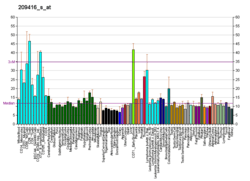FZR1
Fizzy-related protein homolog is a protein that in humans is encoded by the FZR1 gene.[3][4][5]
Interactions
FZR1 has been shown to interact with CDC27[6][7] and FBXO5.[8]
References
- ↑ "Human PubMed Reference:".
- ↑ "Mouse PubMed Reference:".
- ↑ Fang G, Yu H, Kirschner MW (Sep 1998). "Direct binding of CDC20 protein family members activates the anaphase-promoting complex in mitosis and G1". Mol Cell. 2 (2): 163–171. PMID 9734353. doi:10.1016/S1097-2765(00)80126-4.
- ↑ Sorensen CS, Lukas C, Kramer ER, Peters JM, Bartek J, Lukas J (Oct 2000). "Nonperiodic activity of the human anaphase-promoting complex-Cdh1 ubiquitin ligase results in continuous DNA synthesis uncoupled from mitosis". Mol Cell Biol. 20 (20): 7613–7623. PMC 86321
 . PMID 11003657. doi:10.1128/MCB.20.20.7613-7623.2000.
. PMID 11003657. doi:10.1128/MCB.20.20.7613-7623.2000. - ↑ "Entrez Gene: FZR1 fizzy/cell division cycle 20 related 1 (Drosophila)".
- ↑ Zhou, Yuan; Ching Yick-Pang; Ng Raymond W M; Jin Dong-Yan (Sep 2003). "Differential expression, localization and activity of two alternatively spliced isoforms of human APC regulator CDH1". Biochem. J. England. 374 (Pt 2): 349–58. PMC 1223613
 . PMID 12797865. doi:10.1042/BJ20030600.
. PMID 12797865. doi:10.1042/BJ20030600. - ↑ Kramer, E R; Gieffers C; Hölzl G; Hengstschläger M; Peters J M (Nov 1998). "Activation of the human anaphase-promoting complex by proteins of the CDC20/Fizzy family". Curr. Biol. ENGLAND. 8 (22): 1207–S4. ISSN 0960-9822. PMID 9811605. doi:10.1016/S0960-9822(07)00510-6.
- ↑ Hsu, Jerry Y; Reimann Julie D R; Sørensen Claus S; Lukas Jiri; Jackson Peter K (May 2002). "E2F-dependent accumulation of hEmi1 regulates S phase entry by inhibiting APC(Cdh1)". Nat. Cell Biol. England. 4 (5): 358–366. ISSN 1465-7392. PMID 11988738. doi:10.1038/ncb785.
Further reading
- Kramer ER, Gieffers C, Hölzl G, et al. (1999). "Activation of the human anaphase-promoting complex by proteins of the CDC20/Fizzy family". Curr. Biol. 8 (22): 1207–S4. PMID 9811605. doi:10.1016/S0960-9822(07)00510-6.
- Kotani S, Tanaka H, Yasuda H, Todokoro K (1999). "Regulation of APC activity by phosphorylation and regulatory factors". J. Cell Biol. 146 (4): 791–800. PMC 2156135
 . PMID 10459014. doi:10.1083/jcb.146.4.791. (Retracted. If this is intentional, please replace
. PMID 10459014. doi:10.1083/jcb.146.4.791. (Retracted. If this is intentional, please replace {{Retracted}}with{{Retracted|intentional=yes}}.) - Gieffers C, Peters BH, Kramer ER, et al. (1999). "Expression of the CDH1-associated form of the anaphase-promoting complex in postmitotic neurons". Proc. Natl. Acad. Sci. U.S.A. 96 (20): 11317–11322. PMC 18031
 . PMID 10500174. doi:10.1073/pnas.96.20.11317.
. PMID 10500174. doi:10.1073/pnas.96.20.11317. - Nagase T, Ishikawa K, Kikuno R, et al. (2000). "Prediction of the coding sequences of unidentified human genes. XV. The complete sequences of 100 new cDNA clones from brain which code for large proteins in vitro". DNA Res. 6 (5): 337–345. PMID 10574462. doi:10.1093/dnares/6.5.337.
- Bembenek J, Yu H (2002). "Regulation of the anaphase-promoting complex by the dual specificity phosphatase human Cdc14a". J. Biol. Chem. 276 (51): 48237–42. PMID 11598127. doi:10.1074/jbc.M108126200.
- Stroschein SL, Bonni S, Wrana JL, Luo K (2001). "Smad3 recruits the anaphase-promoting complex for ubiquitination and degradation of SnoN". Genes Dev. 15 (21): 2822–36. PMC 312804
 . PMID 11691834. doi:10.1101/gad.912901.
. PMID 11691834. doi:10.1101/gad.912901. - Hsu JY, Reimann JD, Sørensen CS, et al. (2002). "E2F-dependent accumulation of hEmi1 regulates S phase entry by inhibiting APC(Cdh1)". Nat. Cell Biol. 4 (5): 358–366. PMID 11988738. doi:10.1038/ncb785.
- Zur A, Brandeis M (2002). "Timing of APC/C substrate degradation is determined by fzy/fzr specificity of destruction boxes". EMBO J. 21 (17): 4500–4510. PMC 126191
 . PMID 12198152. doi:10.1093/emboj/cdf452.
. PMID 12198152. doi:10.1093/emboj/cdf452. - Strausberg RL, Feingold EA, Grouse LH, et al. (2003). "Generation and initial analysis of more than 15,000 full-length human and mouse cDNA sequences". Proc. Natl. Acad. Sci. U.S.A. 99 (26): 16899–16903. PMC 139241
 . PMID 12477932. doi:10.1073/pnas.242603899.
. PMID 12477932. doi:10.1073/pnas.242603899. - Zhou Y, Ching YP, Chun AC, Jin DY (2003). "Nuclear localization of the cell cycle regulator CDH1 and its regulation by phosphorylation". J. Biol. Chem. 278 (14): 12530–12536. PMID 12560341. doi:10.1074/jbc.M212853200.
- Zhou Y, Ching YP, Ng RW, Jin DY (2003). "Differential expression, localization and activity of two alternatively spliced isoforms of human APC regulator CDH1". Biochem. J. 374 (Pt 2): 349–58. PMC 1223613
 . PMID 12797865. doi:10.1042/BJ20030600.
. PMID 12797865. doi:10.1042/BJ20030600. - Vodermaier HC, Gieffers C, Maurer-Stroh S, et al. (2004). "TPR subunits of the anaphase-promoting complex mediate binding to the activator protein CDH1". Curr. Biol. 13 (17): 1459–1468. PMID 12956947. doi:10.1016/S0960-9822(03)00581-5.
- Wei W, Ayad NG, Wan Y, et al. (2004). "Degradation of the SCF component Skp2 in cell-cycle phase G1 by the anaphase-promoting complex". Nature. 428 (6979): 194–198. PMID 15014503. doi:10.1038/nature02381.
- Listovsky T, Oren YS, Yudkovsky Y, et al. (2005). "Mammalian Cdh1/Fzr mediates its own degradation". EMBO J. 23 (7): 1619–1626. PMC 391060
 . PMID 15029244. doi:10.1038/sj.emboj.7600149.
. PMID 15029244. doi:10.1038/sj.emboj.7600149. - Grimwood J, Gordon LA, Olsen A, et al. (2004). "The DNA sequence and biology of human chromosome 19". Nature. 428 (6982): 529–535. PMID 15057824. doi:10.1038/nature02399.
- Nourry C, Maksumova L, Pang M, et al. (2005). "Direct interaction between Smad3, APC10, CDH1 and HEF1 in proteasomal degradation of HEF1". BMC Cell Biol. 5: 20. PMC 420458
 . PMID 15144564. doi:10.1186/1471-2121-5-20.
. PMID 15144564. doi:10.1186/1471-2121-5-20. - Gerhard DS, Wagner L, Feingold EA, et al. (2004). "The status, quality, and expansion of the NIH full-length cDNA project: the Mammalian Gene Collection (MGC)". Genome Res. 14 (10B): 2121–2127. PMC 528928
 . PMID 15489334. doi:10.1101/gr.2596504.
. PMID 15489334. doi:10.1101/gr.2596504. - Kraft C, Vodermaier HC, Maurer-Stroh S, et al. (2005). "The WD40 propeller domain of Cdh1 functions as a destruction box receptor for APC/C substrates". Mol. Cell. 18 (5): 543–553. PMID 15916961. doi:10.1016/j.molcel.2005.04.023.
This article is issued from
Wikipedia.
The text is licensed under Creative Commons - Attribution - Sharealike.
Additional terms may apply for the media files.


